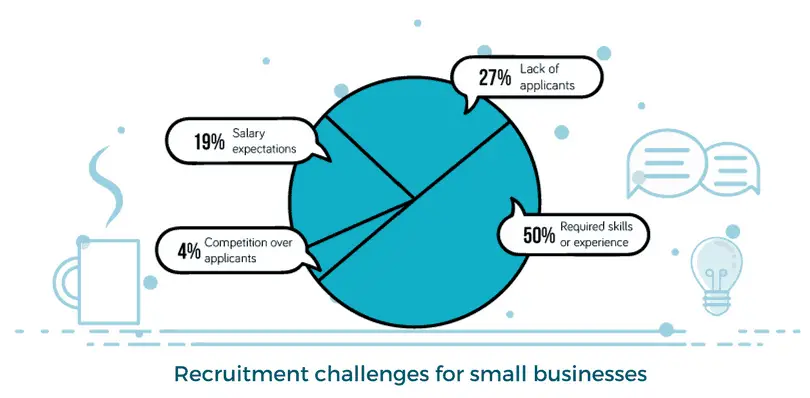Click here to get this post in PDF
 When it comes to recruiting talent into an organisation, it can be challenging, to say the least. When the global financial crisis hit in 2008, companies had their pick of candidates but the tides have turned and now it seems that businesses are facing a fresh set of challenges. With a recent survey from Forde HR Cloud revealing that as many as 2 out of 3 managers come up against challenges when trying to recruit staff into their business, it is clear that something is not quite right.
When it comes to recruiting talent into an organisation, it can be challenging, to say the least. When the global financial crisis hit in 2008, companies had their pick of candidates but the tides have turned and now it seems that businesses are facing a fresh set of challenges. With a recent survey from Forde HR Cloud revealing that as many as 2 out of 3 managers come up against challenges when trying to recruit staff into their business, it is clear that something is not quite right.
What are the challenges?
The survey revealed many challenges, but a lack of skills and expertise came out on top, with a staggering 50% of respondents. The question is – should managers just ‘settle’ or keep recruiting until they find the ‘perfect’ candidate or are there in fact, other options?
Thinking outside the box
It seems hard to believe that as many as half of applicants don’t have the right skills or experience for a job – or at least, transferable skills, so are managers just being too picky?
SME’s often don’t have the luxury of being able to train new staff from scratch, so it is understandable that there is some expectation that they are equipped with the tools for the job and be able to ‘hit the ground running.’ However, managers must think outside the box, as by doing this, they may actually find some real hidden talent. They may find candidates who are the perfect fit, even if it doesn’t appear so on paper.
Recruiting Graduates
Unbelievably, 1 in 10 skilled graduates remain unemployed after 6 months, and with graduation season upon us, there are lots of opportunities for managers to hire great talent into their SME.
The key is to look at transferable skills. As many as half of graduates end up in careers outside of their chosen studies, as many courses cover subjects which are suitable for all kinds of industries. Graduates are skilled and they also offer many other qualities, which are ideal for SMEs. They are often hard-working, keen to learn, and eager for a challenge. These qualities are perfect for small businesses who want to grow their business.
No experience?
Managers tend to focus too much on the experience candidates have, rather than the transferable skills they offer. Of course, it would be ideal to find a candidate who had the exact experience you were looking for, but as this is highly unlikely, it is important to focus on other qualities too. Have you ever hired a candidate with the experience you wanted but they were unreliable, unmotivated, or just not right for the culture? The chances are that the answer is yes, so remember this the next time you screen CV’s and consider looking at their skills and qualities first.
What to look for
Of course, not all skills are transferable to different industries, as some may be very specific. However, depending on the type of role you are recruiting for, you may find that transferable skills will work well.
For example, you may be looking for someone to work in your recruitment department, but they may not have specific recruitment skills. However, if they have good communication and organisational skills, attention to detail, and are a great culture fit – don’t discount them straight away. The same applies to many other jobs.
CV warning signs
Instead of just focusing on specific experience when shortlisting candidates, look out for other CV warning signs. For example, do they have good writing skills? Are the spelling and grammar accurate? Do they have a consistent and clear career history? Does their CV make sense?
If the answer is no – this is probably more of a red flag than whether or not they have the exact experience you are looking for.
Attitude over skills and experience
Of course, the right skills and experience are important and a team should have a nice mix of those who are skilled, with those who are learning and becoming skilled. It is unrealistic to expect managers to train everyone from the ground – it would just not be possible to resource this.
However, if you train someone from the beginning, you will often find that you will be rewarded with loyalty, which is often much more valuable. It also gives SME’s the opportunity to mold the candidate to the company.
Instead of instantly discarding applications, consider whether you would be able to offer them an opportunity. They may not tick all the boxes, but they might offer other valuable qualities to the business. When you start to focus on the ‘soft skills’, such as communication, motivation, and time management, you will soon find that it opens up a whole new batch of candidates. As a result, your recruitment efforts are likely to be much more successful.
Image Source: Shutterstock.com
About the Author
 Currently, Dave Clough is managing the expansion of the Digital Marketing team at Belfast-based consultancy Glaze. His background includes Management at Argos and senior positions for numerous leading digital agencies in London.
Currently, Dave Clough is managing the expansion of the Digital Marketing team at Belfast-based consultancy Glaze. His background includes Management at Argos and senior positions for numerous leading digital agencies in London.


[…] You may also like: Recruitment Dilemma: How to Deal with a Lack of Experience and Skills […]